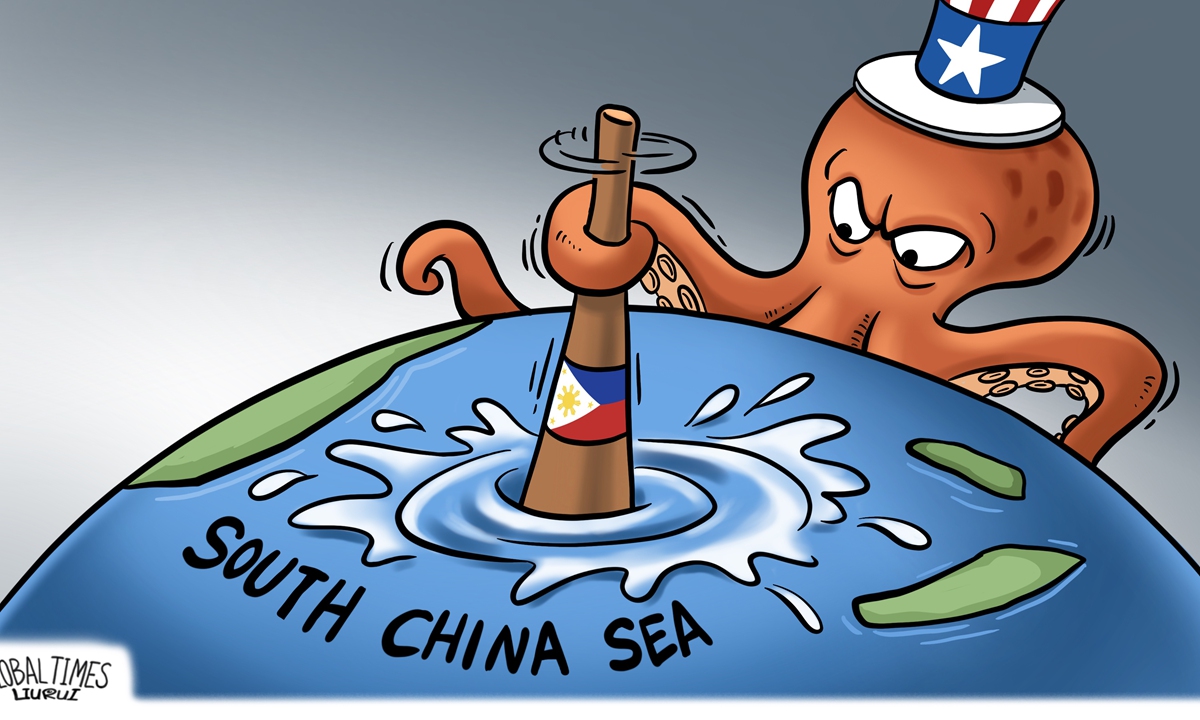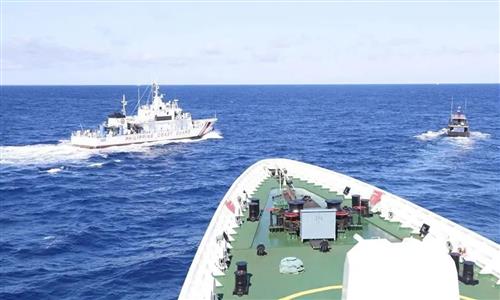Concerns grow over rising US instigation, intervention after US-Philippine defense chiefs' call
Washington treats Manila as cannon fodder, woos it to confront China: analysts

US in South China Sea Illustration:Liu Rui/GT
Chinese observers on Wednesday warned over growing US instigation and intervention after Philippine Defense Secretary Gilberto Teodoro Jr. and US Defense Secretary Lloyd Austin reaffirmed the "ironclad" relations amid the recent tension between China and the Philippines over the Ren'ai Reef in China's Nansha Islands.According to a statement released by the Pentagon on Wednesday, the two defense chiefs reiterated both nations' commitment to bolstering cooperation, including strengthening "bilateral training, interoperability, and support for the modernization of the Philippine Armed Forces."
Austin backed the Philippine's stance in the disputes over the Ren'ai Reef and voiced support for the "2016 arbitral ruling" on the South China Sea, CNN reported, as the two countries are seeking an in-person meeting in the near future.
China does not accept nor recognize the so-called ruling, which is illegal and invalid, seriously violating international laws, including the UN Convention on the Law of the Sea.
Song Zhongping, a Chinese military expert and TV commentator, told the Global Times on Wednesday that China should stay alert to the Philippine's moves and the US' strategic purposes concerning the South China Sea.
The Philippines could be hijacked by the US, which will spare no efforts to woo the Philippines to confront China. The US' aim is crystal clear, Song said. "The Philippines is just a disposable chess piece or cannon fodder in US strategic architecture and Manila should be cautious of being abandoned at any time," he said.
Xu Liping, director of the Center for Southeast Asian Studies at the Chinese Academy of Social Sciences, believe that neither the US nor the Philippines is eyeing direct conflict with China over the Ren'ai Reef.
The US-Philippine alliance is unequal as the US is dominant. Cooperating with the US on some very sensitive topics, the Marcos administration is playing a delicate and dangerous balance between China and the US, Xu told the Global Times on Wednesday.
In 1999, a Philippine warship illegally grounded at the Ren'ai Reef, prompting immediate and serious representations from the Chinese side. The Philippines has repeatedly promised to tow the grounded warship away, but 24 years later, not only has the ship not been removed, but there have also been attempts at repairing and reinforcing it which aim for permanent occupation of the Ren'ai Reef.
The Philippine vessel has been grounded on Ren'ai Reef for 24 years, and suddenly became an issue when the US seeks a stronger presence in the region and drove the Philippines to change the status quo, analysts said.
When a sweeping alliance with the ASEAN bloc is unlikely, the US adopted an approach of dividing ASEAN and breaking the bloc "from the weak points." It is also mobilizing traditional allies like Japan and Australia to increase their military presence in the South China Sea, Song said.
In face of the changing realities in the South China Sea, China should defend itself at the legal level, firmly fight against the so-called arbitral ruling, and enhance maritime law enforcement, Song said. "More importantly we should get prepared for possible US intervention," he said.
Xu stressed that China and the Philippines should resort to bilateral channels to solve disputes rather than introducing a third party with ulterior motives.
As China and the Philippines have agreed that maritime disputes do not represent the totality of bilateral relations, the two countries should join hands to address the issue through dialogue and prevent it from hindering cooperation in other fields, Xu said.

